"THROUGH me you pass into the city of woe:
Through me you pass into eternal pain:
Through me among the people lost for aye.
Justice the founder of my fabric mov'd:
To rear me was the task of power divine,
Supremest wisdom, and primeval love.
Before me things create were none, save things
Eternal, and eternal I endure.
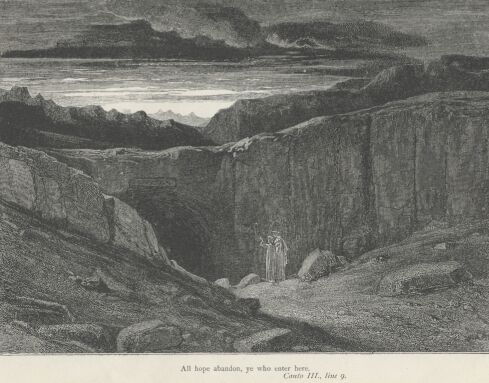
"All hope abandon ye who enter here."
Such characters in colour dim I mark'd
Over a portal's lofty arch inscrib'd:
Whereat I thus: "Master, these words import
Hard meaning." He as one prepar'd replied:
"Here thou must all distrust behind thee leave;
Here be vile fear extinguish'd. We are come
Where I have told thee we shall see the souls
To misery doom'd, who intellectual good
Have lost." And when his hand he had stretch'd forth
To mine, with pleasant looks, whence I was cheer'd,
Into that secret place he led me on.
Here sighs with lamentations and loud moans
Resounded through the air pierc'd by no star,
That e'en I wept at entering. Various tongues,
Horrible languages, outcries of woe,
Accents of anger, voices deep and hoarse,
With hands together smote that swell'd the sounds,
Made up a tumult, that for ever whirls
Round through that air with solid darkness stain'd,
Like to the sand that in the whirlwind flies.
I then, with error yet encompass'd, cried:
"O master! What is this I hear? What race
Are these, who seem so overcome with woe?"
He thus to me: "This miserable fate
Suffer the wretched souls of those, who liv'd
Without or praise or blame, with that ill band
Of angels mix'd, who nor rebellious prov'd
Nor yet were true to God, but for themselves
Were only. From his bounds Heaven drove them forth,
Not to impair his lustre, nor the depth
Of Hell receives them, lest th' accursed tribe
Should glory thence with exultation vain."
I then: "Master! what doth aggrieve them thus,
That they lament so loud?" He straight replied:
"That will I tell thee briefly. These of death
No hope may entertain: and their blind life
So meanly passes, that all other lots
They envy. Fame of them the world hath none,
Nor suffers; mercy and justice scorn them both.
Speak not of them, but look, and pass them by."
And I, who straightway look'd, beheld a flag,
Which whirling ran around so rapidly,
That it no pause obtain'd: and following came
Such a long train of spirits, I should ne'er
Have thought, that death so many had despoil'd.
When some of these I recogniz'd, I saw
And knew the shade of him, who to base fear
Yielding, abjur'd his high estate. Forthwith
I understood for certain this the tribe
Of those ill spirits both to God displeasing
And to his foes. These wretches, who ne'er lived,
Went on in nakedness, and sorely stung
By wasps and hornets, which bedew'd their cheeks
With blood, that mix'd with tears dropp'd to their feet,
And by disgustful worms was gather'd there.
Then looking farther onwards I beheld
A throng upon the shore of a great stream:
Whereat I thus: "Sir! grant me now to know
Whom here we view, and whence impell'd they seem
So eager to pass o'er, as I discern
Through the blear light?" He thus to me in few:
"This shalt thou know, soon as our steps arrive
Beside the woeful tide of Acheron."
Then with eyes downward cast and fill'd with shame,
Fearing my words offensive to his ear,
Till we had reach'd the river, I from speech
Abstain'd. And lo! toward us in a bark
Comes on an old man hoary white with eld,
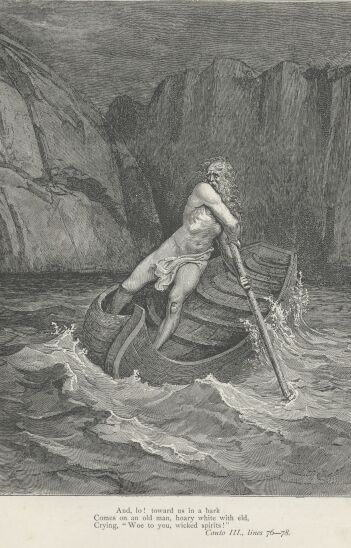
Crying, "Woe to you wicked spirits! hope not
Ever to see the sky again. I come
To take you to the other shore across,
Into eternal darkness, there to dwell
In fierce heat and in ice. And thou, who there
Standest, live spirit! get thee hence, and leave
These who are dead." But soon as he beheld
I left them not, "By other way," said he,
"By other haven shalt thou come to shore,
Not by this passage; thee a nimbler boat
Must carry." Then to him thus spake my guide:
"Charon! thyself torment not: so 't is will'd,
Where will and power are one: ask thou no more."
Straightway in silence fell the shaggy cheeks
Of him the boatman o'er the livid lake,
Around whose eyes glar'd wheeling flames. Meanwhile
Those spirits, faint and naked, color chang'd,
And gnash'd their teeth, soon as the cruel words
They heard. God and their parents they blasphem'd,
The human kind, the place, the time, and seed
That did engender them and give them birth.
Then all together sorely wailing drew
To the curs'd strand, that every man must pass
Who fears not God. Charon, demoniac form,
With eyes of burning coal, collects them all,
Beck'ning, and each, that lingers, with his oar
Strikes. As fall off the light autumnal leaves,
One still another following, till the bough
Strews all its honours on the earth beneath;
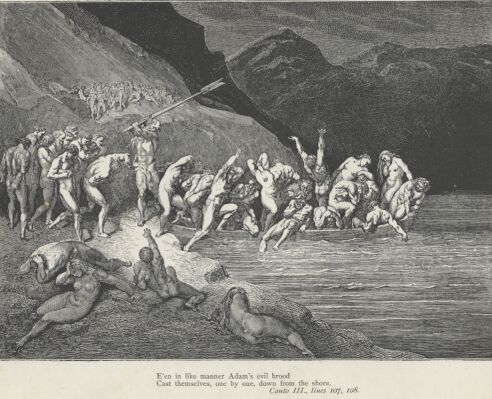
E'en in like manner Adam's evil brood
Cast themselves one by one down from the shore,
Each at a beck, as falcon at his call.
Thus go they over through the umber'd wave,
And ever they on the opposing bank
Be landed, on this side another throng
Still gathers. "Son," thus spake the courteous guide,
"Those, who die subject to the wrath of God,
All here together come from every clime,
And to o'erpass the river are not loth:
For so heaven's justice goads them on, that fear
Is turn'd into desire. Hence ne'er hath past
Good spirit. If of thee Charon complain,
Now mayst thou know the import of his words."
This said, the gloomy region trembling shook
So terribly, that yet with clammy dews
Fear chills my brow. The sad earth gave a blast,
That, lightening, shot forth a vermilion flame,
Which all my senses conquer'd quite, and I
Down dropp'd, as one with sudden slumber seiz'd.
BROKE the deep slumber in my brain a crash
Of heavy thunder, that I shook myself,
As one by main force rous'd. Risen upright,
My rested eyes I mov'd around, and search'd
With fixed ken to know what place it was,
Wherein I stood. For certain on the brink
I found me of the lamentable vale,
The dread abyss, that joins a thund'rous sound
Of plaints innumerable. Dark and deep,
And thick with clouds o'erspread, mine eye in vain
Explor'd its bottom, nor could aught discern.
"Now let us to the blind world there beneath
Descend;" the bard began all pale of look:
"I go the first, and thou shalt follow next."
Then I his alter'd hue perceiving, thus:
"How may I speed, if thou yieldest to dread,
Who still art wont to comfort me in doubt?"
He then: "The anguish of that race below
With pity stains my cheek, which thou for fear
Mistakest. Let us on. Our length of way
Urges to haste." Onward, this said, he mov'd;
And ent'ring led me with him on the bounds
Of the first circle, that surrounds th' abyss.
Here, as mine ear could note, no plaint was heard
Except of sighs, that made th' eternal air
Tremble, not caus'd by tortures, but from grief
Felt by those multitudes, many and vast,
Of men, women, and infants. Then to me
The gentle guide: "Inquir'st thou not what spirits
Are these, which thou beholdest? Ere thou pass
Farther, I would thou know, that these of sin
Were blameless; and if aught they merited,
It profits not, since baptism was not theirs,
The portal to thy faith. If they before
The Gospel liv'd, they serv'd not God aright;
And among such am I. For these defects,
And for no other evil, we are lost;
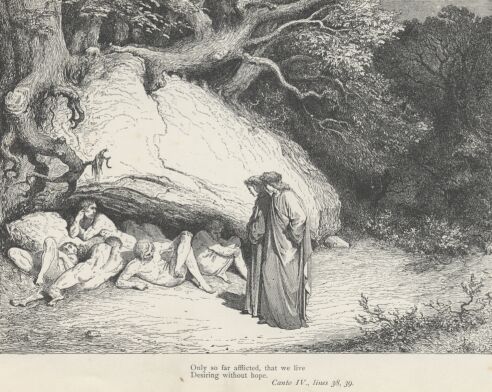
"Only so far afflicted, that we live
Desiring without hope." So grief assail'd
My heart at hearing this, for well I knew
Suspended in that Limbo many a soul
Of mighty worth. "O tell me, sire rever'd!
Tell me, my master!" I began through wish
Of full assurance in that holy faith,
Which vanquishes all error; "say, did e'er
Any, or through his own or other's merit,
Come forth from thence, whom afterward was blest?"
Piercing the secret purport of my speech,
He answer'd: "I was new to that estate,
When I beheld a puissant one arrive
Amongst us, with victorious trophy crown'd.
He forth the shade of our first parent drew,
Abel his child, and Noah righteous man,
Of Moses lawgiver for faith approv'd,
Of patriarch Abraham, and David king,
Israel with his sire and with his sons,
Nor without Rachel whom so hard he won,
And others many more, whom he to bliss
Exalted. Before these, be thou assur'd,
No spirit of human kind was ever sav'd."
We, while he spake, ceas'd not our onward road,
Still passing through the wood; for so I name
Those spirits thick beset. We were not far
On this side from the summit, when I kenn'd
A flame, that o'er the darken'd hemisphere
Prevailing shin'd. Yet we a little space
Were distant, not so far but I in part
Discover'd, that a tribe in honour high
That place possess'd. "O thou, who every art
And science valu'st! who are these, that boast
Such honour, separate from all the rest?"
He answer'd: "The renown of their great names
That echoes through your world above, acquires
Favour in heaven, which holds them thus advanc'd."
Meantime a voice I heard: "Honour the bard
Sublime! his shade returns that left us late!"
No sooner ceas'd the sound, than I beheld
Four mighty spirits toward us bend their steps,
Of semblance neither sorrowful nor glad.
When thus my master kind began: "Mark him,
Who in his right hand bears that falchion keen,
The other three preceding, as their lord.
This is that Homer, of all bards supreme:
Flaccus the next in satire's vein excelling;
The third is Naso; Lucan is the last.
Because they all that appellation own,
With which the voice singly accosted me,
Honouring they greet me thus, and well they judge."
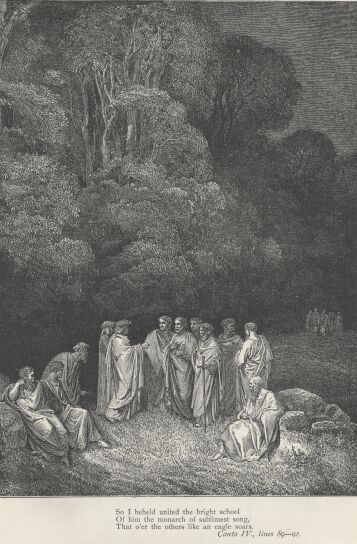
So I beheld united the bright school
Of him the monarch of sublimest song,
That o'er the others like an eagle soars.
When they together short discourse had held,
They turn'd to me, with salutation kind
Beck'ning me; at the which my master smil'd:
Nor was this all; but greater honour still
They gave me, for they made me of their tribe;
And I was sixth amid so learn'd a band.
Far as the luminous beacon on we pass'd
Speaking of matters, then befitting well
To speak, now fitter left untold. At foot
Of a magnificent castle we arriv'd,
Seven times with lofty walls begirt, and round
Defended by a pleasant stream. O'er this
As o'er dry land we pass'd. Next through seven gates
I with those sages enter'd, and we came
Into a mead with lively verdure fresh.
There dwelt a race, who slow their eyes around
Majestically mov'd, and in their port
Bore eminent authority; they spake
Seldom, but all their words were tuneful sweet.
We to one side retir'd, into a place
Open and bright and lofty, whence each one
Stood manifest to view. Incontinent
There on the green enamel of the plain
Were shown me the great spirits, by whose sight
I am exalted in my own esteem.
Electra there I saw accompanied
By many, among whom Hector I knew,
Anchises' pious son, and with hawk's eye
Caesar all arm'd, and by Camilla there
Penthesilea. On the other side
Old King Latinus, seated by his child
Lavinia, and that Brutus I beheld,
Who Tarquin chas'd, Lucretia, Cato's wife
Marcia, with Julia and Cornelia there;
And sole apart retir'd, the Soldan fierce.
Then when a little more I rais'd my brow,
I spied the master of the sapient throng,
Seated amid the philosophic train.
Him all admire, all pay him rev'rence due.
There Socrates and Plato both I mark'd,
Nearest to him in rank; Democritus,
Who sets the world at chance, Diogenes,
With Heraclitus, and Empedocles,
And Anaxagoras, and Thales sage,
Zeno, and Dioscorides well read
In nature's secret lore. Orpheus I mark'd
And Linus, Tully and moral Seneca,
Euclid and Ptolemy, Hippocrates,
Galenus, Avicen, and him who made
That commentary vast, Averroes.
Of all to speak at full were vain attempt;
For my wide theme so urges, that ofttimes
My words fall short of what bechanc'd. In two
The six associates part. Another way
My sage guide leads me, from that air serene,
Into a climate ever vex'd with storms:
And to a part I come where no light shines.